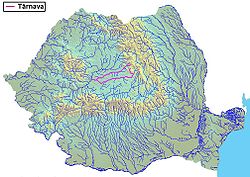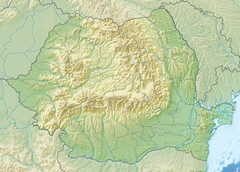Târnava
| Târnava Küküllő, Kokel | |
|---|---|
 | |
| Location | |
| Country | Romania |
| Counties | Alba County |
| Physical characteristics | |
| Source | Confluence of the Târnava Mare and the Târnava Mică |
| • location | Blaj, Romania |
| • coordinates | 46°10′18″N 23°53′35″E / 46.17167°N 23.89306°E |
| Mouth | Mureș |
• location | Teiuș, Romania |
• coordinates | 46°9′16″N 23°41′56″E / 46.15444°N 23.69889°E |
| Length | 23 km (14 mi) |
| Basin size | 6,253 km2 (2,414 sq mi) |
| Discharge | |
| • average | 25 m3/s (880 cu ft/s) |
| Basin features | |
| Progression | Mureș→ Tisza→ Danube→ Black Sea |
| Tributaries | |
| • left | Târnava Mare, Secaș |
| • right | Târnava Mică, Dunărița |
The Târnava (full name in Romanian: Râul Târnava; Hungarian: Küküllő; German: Kokel; Turkish: Kokul or Kokulu) is a river in Romania[1][2]. It is formed by the confluence of the Târnava Mare and Târnava Mică in the town of Blaj. The Târnava flows into the Mureș after 23 km[2][3] near the town of Teiuș. The two source rivers of the Târnava are the Târnava Mare and Târnava Mică, and its tributaries include the Tur, Izvorul Iezerului, Secaș, and the Dunărița[2]. Its drainage basin covers an area of 6,253 km2 (2,414 sq mi)[2].[4]: 22
Etymology
[edit]The name Târnava is of Slavic origin from trn,[5] meaning "thorn".
Other proposed origins for the river's Romanian name is Turn (tower) + dav from Dacian dava (structure/fortress), i.e. "the river that flows amongst towers and davas[citation needed]"; or a reference to the Romanian city of Turda, forming Tur + ava from dava[citation needed].
Trn (thorn) is used by Slavic peoples in the Balkans, Czechia and Slovakia, but the 60% R1a Slavs (Poles, Belarusians, Russians) say syp/ship[citation needed][weasel words].
The Hungarian name Küküllő is of Old Turkic origin from kukel meaning sloe, and is thought to have originated from the Avar people[citation needed].
References
[edit]- ^ "Planul național de management. Sinteza planurilor de management la nivel de bazine/spații hidrografice, anexa 7.1" (PDF, 5.1 MB). Administrația Națională Apele Române. 2010. pp. 337–340.
- ^ a b c d Atlasul cadastrului apelor din România. Partea 1 (in Romanian). Bucharest: Ministerul Mediului. 1992. pp. 156–169. OCLC 895459847. River code: IV.1.96
- ^ 2017 Romanian Statistical Yearbook, p. 13
- ^ Analysis of the Tisza River Basin 2007, IPCDR
- ^ See Trnka, Trnava, etc.



